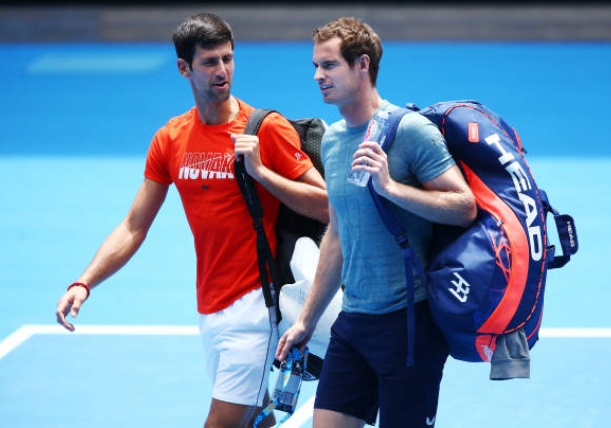
By Richard Pagliaro | Saturday, January 21, 2023
Andy Murray and Novak Djokovic were born one week apart and are bonded by Big 4 history.
Two of tennis' top problem solvers share a simple solution to deter Grand Slam 4 a.m. finishes: Shorten the day session schedule and start the night session sooner.
More: Djokovic Pushes Through Pain
Marathon man Murray pulled off his record 11th career comeback from a two-set deficit defeating Thanasi Kokkinakis in a five hour, 45-minute Australian Open epic that ended at 4 a.m. local time.
The 35-year-old Murray said he initially got only three hours sleep after that match because he had to return to the tournament the same morning to have "about seven or eight blisters that I had to have drained."

Former world No. 1 Murray fought valiantly, but was bounced from the Australian Open third round by Spanish nemesis Roberto Bautista Agut in four sets.
Afterward, Murray said early morning finishes are not only a buzz-kill for players and they aren't healthy for ball kids, officials or fans either.
"I'm sure if you went and spoke to some sleep experts and sports scientists, et cetera, the people that actually really know what's important for athletes to recover, they would tell you that sleep is the number one thing, that that's the most important thing," Murray said. "Finishing matches at 4 in the morning isn't good for the players. I would also argue it's not good for the sport, anyone involved in it. I do think there's some quite simple things that can be done to change that."
The night shift Murray proposes: reduce the day session stadium match schedule from three matches to two matches and start the night schedule a half-hour or full hour earlier.
Five-time AO finalist Murray asserts shortening the stadium day-match schedule means those matches won't spill over into the night session and starting the night session earlier would reduce the prospect of players pulling an all-nighter on court.
"I think the US Open went to playing two matches in the day session. That would stop the day matches running into the night session starting too late," Murray told the media in Melbourne. "I think that's quite a simple one that you could look at. You'd still get quality matches during the day.
"The people who bought ground passes would get to see more of the top players, which would be excellent for them. I think if you did that, you could also potentially bring the night sessions slightly earlier, as well, like 6:00 or 6:30. That time, those few hours, can make a difference to the players. I think that's something that's probably worth, yeah, considering moving forwards."
The US Open has made a similar schedule shift though it still had a historic early-morning finish.
Last September, Carlos Alcaraz defeated Jannik Sinner, 6-3, 6-7(7), 6-7(0), 7-5, 6-3, in a US Open thriller that finished at 2:50 A.M.—the latest finish in US Open history.
Still, nine-time AO champion Novak Djokovic concurs with Murray and says "something needs to be addressed in terms of the schedule."
"I would agree with his points. I think we have days when the day sessions go longer, but probably more days statistically in average where they finish, say, 5, 6 max nd you can start night session an hour earlier at least. I agree with him," Djokovic said. "For the crowd, it's entertaining, it's exciting, to have matches midnight, 1, 2, 3 a.m. For us, it's really grueling.
"Even if you go through and win, prevail in these kind of matches, you still have to come back. You have your sleeping cycle, rhythm disrupted completely, not enough time really to recover for another five-setter."
On the flip side, night session crows in Melbourne and New York are among the most passionate and festive fans in the sport so why pull the plug on the energy and electricity late-night tennis provides?
Furthermore, the 7 p.m. nigh-session start time allow fans watching on television or digital platforms time to get home from work or school and tune into tennis Then, there's network influence on major schedule-makers. Television networks pay millions for rights fees for Australian Open and US Open coverage and want start times that will attract the most viewers and increase their ad revenue bottom line.
Twenty-one time Grand Slam champion Djokovic says while players' input is vital, ultimately the tournaments and television networks will make the final call.
"I think that players' input is always important for tournament organization," Djokovic said. "Whether it's decisive, we know that it's not because it comes down to what the TV broadcasters want to have. That's the ultimate decision maker."
Photo credit: Getty